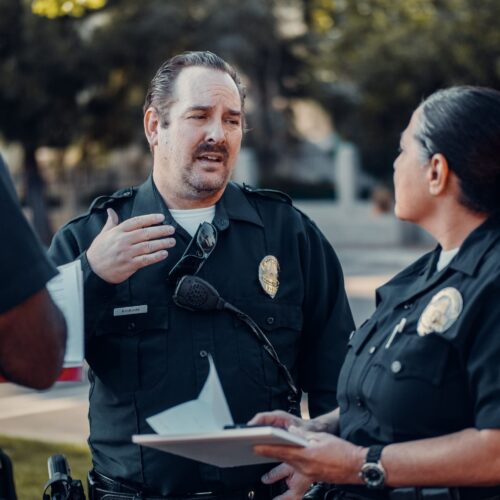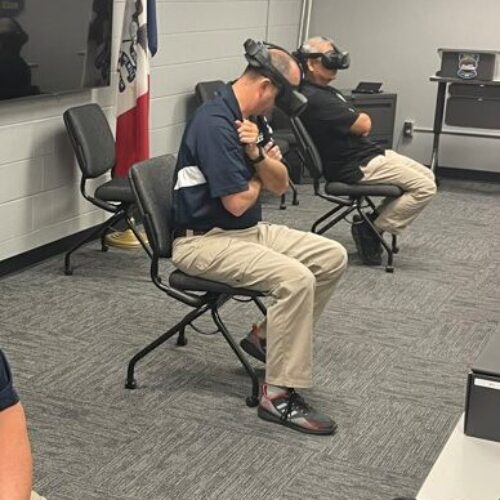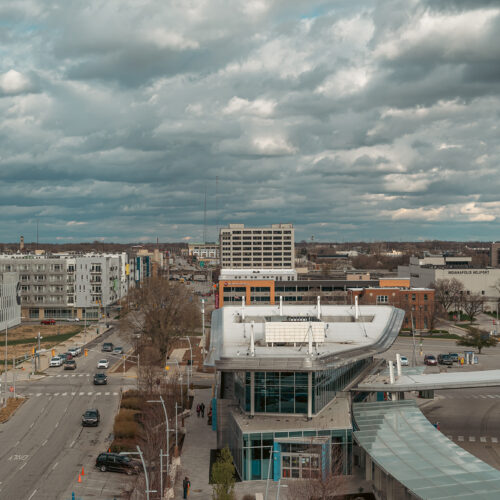
JMHCP Spotlight on Kalamazoo, MI
Each month the Justice Center spotlights collaborative criminal justice/mental health initiatives that have received funding from the Bureau of Justice Assistance’s Justice and Mental Health Collaboration Program (JMHCP). Center staff ask the practitioners in these programs to discuss some successes and challenges they have encountered in the planning and implementation process. This month’s profile is from the Kalamazoo Mental Health Court.
Program Summary
In Michigan, the Kalamazoo 8th District Court has established a Mental Health Recovery Court. The court utilizes forensics peer support specialists and clinical staff provided by Kalamazoo Community Mental Health and Substance Abuse Services. Clinical staff provide eligibility screening, case consultation, and coordination of care. Peer staff who have co-occurring disorders, a long history of recovery, and firsthand experience with the criminal justice system engage and coach participants to adopt and maintain a lifestyle based on recovery and wellness. The court primarily serves individuals who have severe and persistent mental illnesses, and most participants have a co-occurring substance use disorder. The Recovery court strives to identify those individuals who are or are at risk of becoming a high utilizer of mental health, public safety, substance use, or other public sector services.
How did your jurisdiction realize that there was a need to respond to the prevalence of individuals with mental illnesses in the criminal justice system?
The community has been aware for some time that many of the individuals coming before the court had mental health and substance use disorders. Kalamazoo County has long supported jail diversion programs, specialized dockets, and problem-solving courts such as the drug court. We were fortunate to have a judge who made mental health recovery court a priority and partnered with the county mental health agency to develop it.
How did your initiative capitalize on pre-existing relationships or partnerships in the jurisdiction, or build new ones?
Kalamazoo County has a history of strong partnerships among the criminal justice, mental health, and substance use systems. The Kalamazoo County court has a juvenile and an adult drug court, a Sobriety Court, a Family Drug Dependency Court, and a specialized docket for domestic violence. The principles of therapeutic jurisprudence have been accepted by our prosecutors, judicial bench, defense bar, and treatment agencies.
How did you identify your program’s target population?
Prosecutors from county, city and township jurisdictions determined criminal charge eligibility, while Kalamazoo Community Mental Health and Substance Abuse Services determined clinical criteria. Recovery court primarily works with misdemeanants who have severe or severe and persistent mental illness and are eligible for case management services. Felony diversions are handled on a case by case basis. Co-occurring substance use disorders also occur in over 80% of our participants.
What has been your biggest challenge and how are you addressing it?
A first major concern has been sustainability, given the current economic climate, and so we are hoping to learn more about creative funding solutions. Second, although engagement in the court process itself has been very successful, there remains the challenging process of engaging participants in recovery oriented lifestyles. We are exploring motivational incentive programs as presented by the Substance Abuse and Mental Health Services Administration (SAMSHA) / National Institute on Drug Abuse (NIDA) Blending Initiative to increase participation in peer-delivered services such as Wellness Recovery Action Planning (WRAP) groups.
Provide an example of a particular success your program has had to date, either in moving from planning to implementation or in showing an impact on an individual, group, or community.
The process of planning and implementation was smooth and efficient due to our community’s history of supporting non-traditional criminal justice, mental health and substance use programming; recovery court had strong champions within all of these systems. A more specific success involved one of the court’s first participants. A middle aged man diagnosed with schizophrenia went from being extremely isolative, rarely leaving his adult foster care home, to volunteering at the local drop-in, answering phones and participating in a WRAP group. We believe that the personal attention and coaching from the judge and forensic peer support specialists helped him to become part of a broader community.
What steps have you taken or are planning to take to sustain your initiative?
First, we are planning to network heavily during the grantee training event [a two day conference to be sponsored by the Bureau of Justice Assistance for all Justice and Mental Health Collaboration grantees in July 2009] to hear what others are doing and whether they have identified alternative sources of funding. Our budget cycle for 2010 is just beginning and the amount of match needed in the second year will become more difficult to raise given the economic situation in Michigan and our Governor’s recent executive order to reduce general fund dollars available to community mental health service programs. Nevertheless, we are confident that our community partners and supporters will continue to make the recovery court a priority.
For questions or comments please contact:
Robert Butkiewicz, MA LLC, Program Supervisor
Kim Rychener, MSW, Deputy Director Access & Adult Mental Health/Substance Abuse
(269)-373-6000
Jeff Patton, Executive Director (269) 553-8000
********This application deadline has passed******** With support from the U.S. Department of Justice’s Office of…
Read MoreUnlike drug courts, which have been informed by national standards for 10 years, mental health courts (MHCs)…
Read More Building a Better Mental Health Court: New Hampshire Judicial Branch Establishes State Guidelines
Read More
Building a Better Mental Health Court: New Hampshire Judicial Branch Establishes State Guidelines
Read More
 Apply Now to Join a Community of Practice on Police-Mental Health Collaboration Staff Wellness
Apply Now to Join a Community of Practice on Police-Mental Health Collaboration Staff Wellness
With support from the U.S. Department of Justice’s Office of Justice Programs’…
Read More Empathetic Policing: Mason City Police Department Launches Virtual Reality Training Program to Help Officers Better Understand Behavioral Health Crises
Read More
Empathetic Policing: Mason City Police Department Launches Virtual Reality Training Program to Help Officers Better Understand Behavioral Health Crises
Read More
 Biden Signs Six-Bill Spending Package Funding Key Criminal Justice Programs
Biden Signs Six-Bill Spending Package Funding Key Criminal Justice Programs
On March 9, 2024, President Joe Biden signed a $460 billion spending…
Read More











